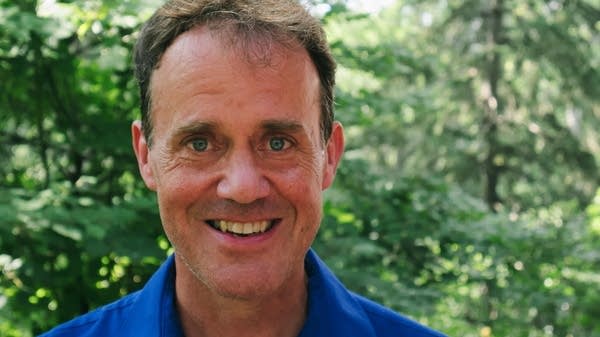At first glance it looks like a banjo which has grown an extra neck, or been crossed with the harplike lyre.
The krar is, in fact, an Ethiopian instrument widely used in East Africa, and it will be heard Saturday at the Cedar Cultural Center in Minneapolis, as part of Night 2 of the Cedar Commissions. (Learn more about Night 1 in our interview with composer Anat Spiegel.)
Tensae Fayise is one of six Minnesota-based composers presenting new work this year, and the krar is the front and center of her musical universe. Her relationship with the instrument is relatively recent, although its sounds have filled the family home since her parents migrated from Ethiopia to the United States, settling initially in South Dakota.
"There were a lot of things happening in Ethiopia in the '70s and '80s, including the Red Terror and folks getting forced into the military," she says. "My parents wanted to get away from that."
Like so many immigrants before and since, Fayise's family brought their music and their culture with them.
"I grew up listening to a lot of traditional Ethiopian music and singing on tape cassette, and going to a lot of live events in Worthington, Minn., where there's a big Ethiopian community," she says.
"My mom comes from a farming family, and in rural communities in Ethiopia there's a musicality to everything. When I talk to my mom she'll sing me all these different songs that she grew up around; it's all oral tradition."
Although Fayise was born in Sioux Falls, S.D., the Ethiopian music that she heard struck inexplicable chords within her, and the call of her ancestral homeland became stronger with age.
To answer it, she made a series of trips to Ethiopia with her mother, hiking the highland trails her mother knew and reconnecting with family members in her home village.

"When I was there in 2018, I got my first krar and brought it back to Minnesota," she says.
Learning how to play it unlocked a flow of creativity unlike anything Fayise had experienced previously.
"I couldn't stop writing music. I would take the krar, play and sing something, then post it on Instagram," she says.
"The krar is a farmer's instrument. They say it was originally made out of a turtle shell with strings from the gut of an animal. To me, it's a very familiar sound, like time travel, a kind of map for understanding this journey of my family."
In forging a personal style for her music, Fayise has absorbed a myriad of influences from her American upbringing, to add to her Ethiopian heritage.
"Growing up in Worthington, my friends were listening to country music, hip-hop, jazz and soul, and I enjoyed that, too," she says.
"When I started singing and composing I would begin with more traditional sounds, then steer over to a more Western style.
"At first I would try to correct that by sticking to the traditional Ethiopian scales, but then I realized I needed the freedom to move in any direction I would like to."
The piece Fayise has written for her Cedar Commission is called Ye Terrarou Tenfash (The Breath of the Mountain), a set of six songs whose title has a specific meaning.
"For me, that breath is my mom's breath, because she's the one who walked up and down those mountains growing up," Fayise says. "She's the one who was immersed in that way of life; she's the bridge for me to go home. She left the village, but the village never left her."
Fayise will play the krar and sing in Saturday's premiere of Ye Terrarou Tenfash and is joined on stage by guitarist Joseph Damon, drummer Stephanie Watts and bassist Jordan Hamilton.
Fayise describes Ye Terrarou Tenfash as "tracing our origin story back further than the conditions that we are dealing with here in America," and says the work "belongs to a larger community working to reclaim our cultural traditions."
Appropriately, many of her friends and family from that larger community will make the trip to Minneapolis for the first performance.
"My brother is flying in with his wife from California, and I have family that's driving from Rochester and South Dakota," she says with a smile. "And a group of 18 is coming from Worthington in a van."
Fayise lives in Minneapolis and won't have far to go Saturday evening. For her, the Cedar Cultural Center was already familiar territory before receiving her commission.
"I love to go there for shows; some of my favorite global musicians are always there," she says.
Now, she adds, the center has taken an even more central position in her life, resetting the parameters of what she might do as a creative artist in the future.
"I'm already thinking of Ye Terrarou Tenfash as an album, and I'm already thinking about the album after that," she says. "Before the Cedar Commissions, did I really think of myself as a composer? Maybe not so much. But now I do."
Event details
What: Cedar Commissions Night 2: Rebecca Nichloson, Dua Saleh and Tensae Fayise
Where: Cedar Cultural Center
When: 7:30 p.m. Feb. 22
Tickets: $10; $15 two-show pass
This is an all-ages show.
Learn more about Night 1 in our interview with composer Anat Spiegel.
Love the music?
Show your support by making a gift to YourClassical.
Each day, we’re here for you with thoughtful streams that set the tone for your day – not to mention the stories and programs that inspire you to new discovery and help you explore the music you love.
YourClassical is available for free, because we are listener-supported public media. Take a moment to make your gift today.









